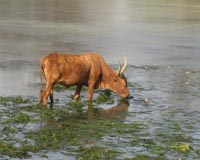| . |  |
. |
Male (AFP) Sept 7, 2009 The Maldives, whose fight against rising sea levels has become a cause celebre for environmentalists, said Monday it would have to skip UN climate change talks in Copenhagen this year to save money. "We can't go to Copenhagen because we don't have the money," President Mohamed Nasheed told reporters, adding that he was staying away to set an example of cost-saving to the rest of the government. In 2007, the UN's Intergovernmental Panel on Climate Change (IPCC) warned that a rise in sea levels of 18 to 59 centimetres (7.2 to 23.2 inches) by 2100 would be enough to make the Maldives virtually uninhabitable. Over 80 percent of the country's land, composed of 1,192 coral islands scattered off southern India, is less than one metre above mean sea level. Nasheed, the first democratically elected president of the archipelago, said the economy was in serious trouble because of a fall in tourism revenues that has sent the budget deficit to a record 34 percent of gross domestic product. In the past, in a move that drew attention to the plight of the nation's 330,000-strong population, Nasheed has said the government would begin saving to buy a new homeland for its people to flee to in the future. Sri Lanka, India or Australia have been mooted as destinations. The Copenhagen meeting of world powers aims to set curbs on emissions of heat-trapping greenhouse gases beyond 2012, with intermediate targets for 2020 that would be ratcheted up all the way to 2050. Some campaigners said the negotiations would be weakened if the Maldives were missing, given their vocal campaigning for greenhouse gas caps and their vital interest in a deal being reached. "They are the most vulnerable and if they don't participate and get heard then obviously it's bad for the whole negotiation process," said Kushal Yadav from the Centre for Science and Environment think-tank in New Delhi. "There should be a fund ... which will sponsor their visit," he added. Nasheed said he was hoping that the world's leading countries would agree to take steps at the conference that would help low-lying nations escape submersion. "My message to the Copenhagen summit is that there is hope. We can reverse the effects of warming," he said at his seafront office in highly congested Male, the densely populated one-square-mile (2.6 square kilometres) capital island. He said he hoped that the summit would focus on renewable energy and transferring cleaner technology to developing nations. Maldives is part of an alliance of 43 tropical island states that has set down proposals for capping global warming to no more than 1.5 degrees Celsius (2.4 degrees Fahrenheit) compared to pre-industrial times. The conference is still a long way from endorsing an even more modest target of two degrees Celsius (3.6 F) championed by the European Union and most green groups. Nasheed has also laid out a plan for the nation of Sunni Muslims to be the first to go carbon neutral by 2020 by moving away from fossil fuels and tapping wind and solar energy. The island's economic woes stem from its dependency on revenues from tourism which have declined due to the global financial crisis. The government wants to cut 15,000 jobs in the 39,000-strong civil service and increase revenues by levying a three-dollar tax per day on holiday makers in the exotic tourist destination. The country's land area is only about 300 square kilometres (115 square miles), while its sea area is nearly 100,000 square kilometres (38,610 square miles). Share This Article With Planet Earth
Related Links Climate Science News - Modeling, Mitigation Adaptation
 Australia 'reef and beef' project seeks to curb flatulent cows
Australia 'reef and beef' project seeks to curb flatulent cowsSydney (AFP) Sept 4, 2009 An Australian scientist Friday launched what he called a "reef and beef" study into whether feeding cows seaweed would reduce their flatulent carbon emissions, in a move that could help save the Great Barrier Reef. Tony Parker, from James Cook University, said cattle produced up to 20 percent of global man-made methane emissions, and the problem was largely linked to their diet. At least ... read more |
|
| The content herein, unless otherwise known to be public domain, are Copyright 1995-2009 - SpaceDaily. AFP and UPI Wire Stories are copyright Agence France-Presse and United Press International. ESA Portal Reports are copyright European Space Agency. All NASA sourced material is public domain. Additional copyrights may apply in whole or part to other bona fide parties. Advertising does not imply endorsement,agreement or approval of any opinions, statements or information provided by SpaceDaily on any Web page published or hosted by SpaceDaily. Privacy Statement |